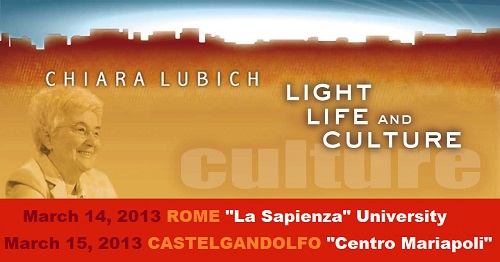Rome: a conference entitled “Chiara Lubich. Light, Life and Culture”

Five years on from the death of Chiara Lubich, founder of the focolari Movement, over 600 participants, including university lecturers, scholars, researchers, doctoral students and undergraduates, from every part of the world, retraced the evolution of, and recent developments relating to her spiritual doctrine. The conference was organized by New Humanity, Cittànuova and Sophia University Institute in the Aula Magna of “Sapienza” University in Rome (Italy) on 14th March 2013.
Official website of this event
The event opened with messages from the President of the Italian Republic, Giorgio Napolitano, from Card. Gianfranco Ravasi President of the Pontifical Council for Culture, and with the welcome of Ambassador Lucio Alberto Savoia, Secretary General of the Italian Commission to UNESCO.
Amongst the speakers, numerous academics from foreign universities (Lombardi from Maracaibo, Gabriel from Vienna, Pearce from New York), as well as from Italian ones (Amaldi from Milano, Scaraffia from La Sapienza in Rome), and also Gianni Alemanno, Mayor of the city of Rome – who earlier that same day, had also unveiled a plaque dedicated to Lubich at the new “Libia” station on underground line B1, further highlighting the link between her and the eternal city.
Study was Lubich’s great passion, and she abandoned it, “consigning her books to the attic”, in order to devote herself to the nascent focolari Movement. But the charisma bestowed upon her was also destined to flourish in cultural matters, as prove both her numerous honorary degrees and the hundreds of scholars present at the conference. Although we are still in the early stages of this research, the first effects are being noticed in contemporary scholarship: the environmental question, economics in the era of common assets, the law and the key issues of politics, are the fields chosen for this turning point, through numerous, expert studies.
The current environmental crisis was illustrated by the philosopher of science Sergio Rondinara, essentially in terms of an anthropological crisis, destined to resolve itself when man rediscovers the meaning of his own relation to nature, as that of being-in-gift.
The economist Luigino Bruni offered his reading of the Economy of Communion as being a new page of charismatic history, in which the situation of global crisis, where individual interest prevails over the common good, can be overcome, by identifying in the tackling of poverty, one of the principal paths to follow.
Law and politics were addressed by the jurist Adriana Cosseddu and by the political scientist Antonio Baggio.
The philosophical and theological roots of the reflections presented in the course of the conference were analysed thoroughly in the contributions of prof. Piero Coda and of the sociologist Vera Araujo.
Maria Voce recalls how, in the lecture halls of this university, she first came into contact with the movement led by Chiara Lubich, and in which she immediately became involved, and of which she is now the president, the first to succeed the founder. She speaks of “culture of resurrection”, a culture which is the fruit of the search for contemporary man: “a search, at times, in the dark and full of suffering, similar to a momentous, collective night”, in which Chiara herself was involved in the final period of her earthly existence. But, at the same time, a passionate search to find and grasp those promising openings “which presage the birth of a new culture which, mysteriously, but really, springs forth from the passage through death towards Life”.
Some impressions gathered at the conclusion of the event:
“Whatever you do, you must think of it in terms of the other. I carry out pre-clinical research, so not only focusing on the results of the work in itself, but always on their meaning for the person in front of me”.
(Micaela Gliozzi- pharmaceuticals researcher from the south of Italy)
“I am grateful to Chiara Lubich for having made a gift of her charisma which has inspired me to develop within my discipline of epistemology a new research path into the relational and social dimension of knowledge”.
(Felipe De Mato Miller, philosopher from Porto Alegre)
“In India, in the field of the economy, one often deals with government. The problem of corruption is no surprise, but I have discovered that I too can contribute to the creation of a better world, together with others, not alone. Faced with a glaring case, I decided not to give in to the attempted corruption, but to continue to speak to the client until I managed to make him change his mind. For sure, it takes much longer, but in the end we got there”.
(Lina O’Bankien, from India, in the field of the economy)


